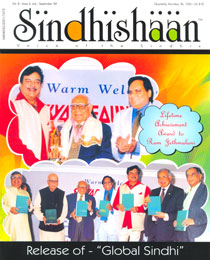![]()
OVER LUNCH AT CAPITAL CLUB
By Rahul Sharma
In September 2009 Ram Buxani completes half a century in Dubai. The successful businessman and father of three daughters, looks back at those 50 years with gratitude and fondness. He has, after all, known Dubai since the days the now-flashy city had no water, no electricity, no roads or telephones and life revolved around a shallow creek.
“I think in true meaning, it is my home. I have every right to say that I belong to this place,” says Buxani. “I came here to make my living. I had no relatives here. I was looking for openings in some overseas company of repute . . . . . . a Sindhi had to go abroad.” Since there was no port, people had to take a boat to shore. Buxani confesses he was fat then and didn't know how to swim. The journey was scary, he said, but he went straight to the office after getting off the boat.
There was little to do around in those days and, Buxani tells me, the only decent eating place that sold kebabs was in Sharjah. The owner would slaughter only one goat a day for the kebabs, which meant people had to make their reservations early.
“Since we did not have telephone, how did we reserve? There used to be only one bank in the region – British Bank of Middle East. We used to request their branch here in Dubai and asked them to send a wireless message to their branch in Sharjah to reserve the kebabs. If you worked up an appetite on the way, chances were you would return hungry as there was only that much available.”
Dubai of course has changed since then. So has Sharjah, and the population of the United Arab Emirates that probably wasn't more than 45,000 then has grown exponentially in recent years. And Sindhis, who as a community are not only entrepreneurial but also hard working, have flourished here in trade through determination, financial agility, strong networking and opportunism.
“When I came here, my company was in the textile business. Textile used to be imported from India, mostly cotton, and then re-exported to Iran,” Buxani says, adding that gradually different products started coming in from other countries. Textiles and canned food from China, vegetables from Holland, footwear from Japan and eventually gold and electronics helped boost Dubai's position as a trading hub.
The main markets were India where consumers stuck in a post-colonial socialist system craved for “imported” goods. Nylon saris from Dubai attracted a huge premium among Indian women who at some point became fed up with cotton. India did not produce nylon textiles probably until the 1970s and traders from Dubai filled that gap. “Millions and millions of yards of nylon were being ordered. When flights eventually started between Dubai and India . . . . . . imagine a flight of 350 passengers and each carrying at least six saris. Each sari was about six yards!” Buxani tells me.
The company he worked for later moved into electronics and watches. Traders would get products from Japan and then go the airport and the port to sell them. It was another matter that many in Japan needed an atlas to locate Dubai's location. Also, in those days traders could go inside the planes and ships to sell stuff. Things are of course vastly different today as the world grapples with an economic downturn.
Buxani, the true businessman, while hurting, sees opportunity in the slowdown. He says that while it would take time for Dubai to emerge from the crisis its world-class infrastructure would make things easier. “With this infrastructure, nothing will go wrong. People will start getting services at competitive price. Dubai has always delivered,” says the man who wears four rather visible rings – studded with jade, yellow sapphire, coral and diamonds – on his fingers.
I ask him does he believe in the power of stones like many Indians. “Normally when people ask me why I am wearing so many rings, I just say I am just following Amitabh Bachchan,” referring to the Bollywood icon who wears many rings too. But then he explains : one is aimed at anger management, another for good health, third a gift from his spiritual guru and the last one merely has his initials. Part of him is indeed a believer, I guess.
Buxani says he did miss having a son, initially. “But subsequently I feel that girls are much better than boys. Of course, they have got their own role to play and boys have to take care of different things. But if girls are given proper education and training, they turn out to be much better than boys.”
None of his daughters is part of his business, even though he did want them to join him.
As he prepares to mark his golden jubilee in Dubai, Buxani wants the UAE to retain people who have been living here for a long time. “Many people have been using Dubai as a transitory port. They come here from India or Pakistan and live here two three years and on the basis of the stay here they take visas for Canada, Australia or the USA and go there and live there. For long timers who have lived here, that experience should not go futile,” he says.
“What is America? It is land of immigrants and they have made it the world's strongest country. Same thing can happen here.”


